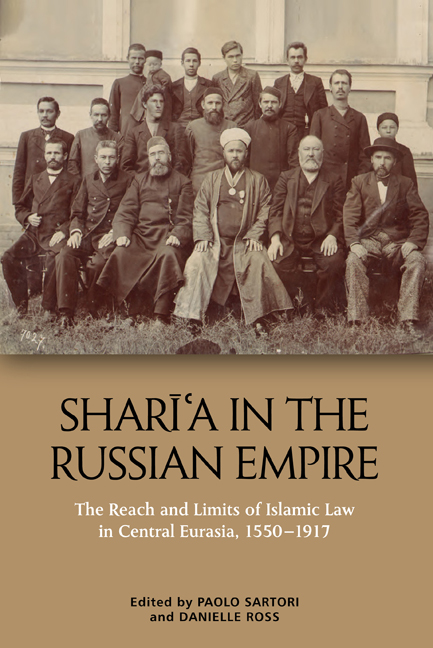Book contents
- Frontmatter
- Contents
- List of Contributors
- Introduction: The Reach and Limits of Sharīʿa in the Russian Empire, c.1552–1917
- 1 Islamic Education for All: Technological Change, Popular Literacy and the Transformation of the Volga-Ural Madrasa, 1650s–1910s
- 2 Taqlīd and Discontinuity: The Transformation of Islamic Legal Authority in the Volga-Ural Region
- 3 Debunking the ‘Unfortunate Girl’ Paradigm: Volga-Ural Muslim Women’s Knowledge Culture and its Transformation across the Long Nineteenth Century
- 4 Between Imperial Law and Islamic Law: Muslim Subjects and the Legality of Remarriage in Nineteenth-century Russia
- 5 Islamic Scholars among the Kereys of Northern Kazakhstan, 1680–1850
- 6 Tinkering with Codification in the Kazakh Steppe: ʿĀdat and Sharīʿa in the Work of Efim Osmolovskii
- 7 Taqlīd and Ijtihād over the Centuries: The Debates on Islamic Legal Theory in Daghestan, 1700s–1920s
- 8 Kunta Ḥājjī and the Stolen Horse
- 9 What We Talk about When We Talk about Taqlīd in Russian Central Asia
- 10 Take Me to Khiva: Sharīʿa as Governance in the Oasis of Khorezm (Nineteenth Century–Early Twentieth)
- Index
1 - Islamic Education for All: Technological Change, Popular Literacy and the Transformation of the Volga-Ural Madrasa, 1650s–1910s
Published online by Cambridge University Press: 22 September 2020
- Frontmatter
- Contents
- List of Contributors
- Introduction: The Reach and Limits of Sharīʿa in the Russian Empire, c.1552–1917
- 1 Islamic Education for All: Technological Change, Popular Literacy and the Transformation of the Volga-Ural Madrasa, 1650s–1910s
- 2 Taqlīd and Discontinuity: The Transformation of Islamic Legal Authority in the Volga-Ural Region
- 3 Debunking the ‘Unfortunate Girl’ Paradigm: Volga-Ural Muslim Women’s Knowledge Culture and its Transformation across the Long Nineteenth Century
- 4 Between Imperial Law and Islamic Law: Muslim Subjects and the Legality of Remarriage in Nineteenth-century Russia
- 5 Islamic Scholars among the Kereys of Northern Kazakhstan, 1680–1850
- 6 Tinkering with Codification in the Kazakh Steppe: ʿĀdat and Sharīʿa in the Work of Efim Osmolovskii
- 7 Taqlīd and Ijtihād over the Centuries: The Debates on Islamic Legal Theory in Daghestan, 1700s–1920s
- 8 Kunta Ḥājjī and the Stolen Horse
- 9 What We Talk about When We Talk about Taqlīd in Russian Central Asia
- 10 Take Me to Khiva: Sharīʿa as Governance in the Oasis of Khorezm (Nineteenth Century–Early Twentieth)
- Index
Summary
In the lessons on Sharḥ-i Mullā, a student reads [the word] ‘maḥrām’,
If you leave me, my darling, my beloved will be forbidden to me.
The lessons from Isaghūjī are full of zeal.
I saw you, my darling, and it touched my soul …
When Isaghūjī is finished, a student begins to read Shamsiyya,
In heaven, my angel, your black hair will be a shawl for you.
During ʿaqīda lessons, I look lovingly at the Ḥāshiyya,
In fact, my darling, I am in love with your ebony eyebrows …
Introduction
In the above song, transcribed in 1915 by Ṣunʿatullāh bin Mullā Badraddīn, an imam posted in Keche Mui village, about 100 miles east of Kazan, a madrasa student confesses his feelings for his beloved. In this confession, he references numerous traditional Arabic and Persian-language books on ṣarf (grammar), fiqh (jurisprudence), manṭiq (logic) and ʿaqīda (doctrine). A few pages later, in the same diary, he records a list of the Tatar ‘national’ novels he had read in 1912.
Ṣunʿatullāh was one beneficiary of a process of rising literacy and education reform that had begun a century before he penned the song cited above: a village imam who was trained to educate people in the fundamen¬tals of Islam, resolve Islamic legal questions, communicate with imperial authorities in the Russian language, teach children to think of themselves as part of a Tatar ethno-national/linguistic community and model new technologies, farming techniques and ideas. Ṣunʿatullāh represented a new vision of what an Islam scholar (ʿalīm) could be. Simultaneously a preacher, a schoolteacher, a legal expert, a gardener and a beekeeper, he was jack-of-all-trades who would use his broad range of knowledge to help his increasingly literate congregation navigate the pitfalls of twenti¬eth-century life without losing touch with their faith.
Studies of Muslim education in the Volga-Ural region have focused overwhelmingly on the so-called Jadid movement of the late 1800s and early 1900s. This narrow focus and the accompanying debates over Jadidism's mass appeal and relevance obscure the broader history of Muslim knowl¬edge transmission under Russian rule. This chapter will argue that the debates and transformations that occurred in Volga-Ural Muslim men's education from the 1880s to 1917 were not unique or isolated, but, rather, represented the culmination of longer-term developments in ʿulamāʾ culture and popular religiosity.
- Type
- Chapter
- Information
- Shari'a in the Russian EmpireThe Reach and Limits of Islamic Law in Central Eurasia, 1550-1917, pp. 38 - 80Publisher: Edinburgh University PressPrint publication year: 2020



